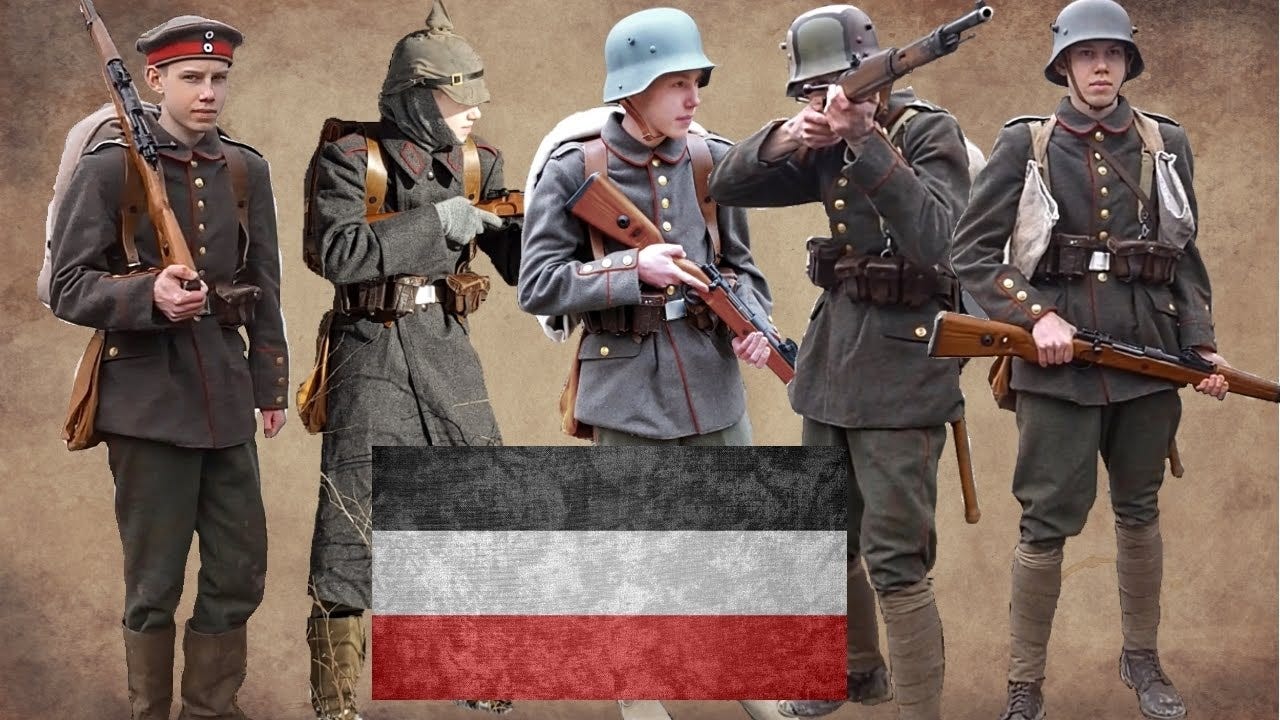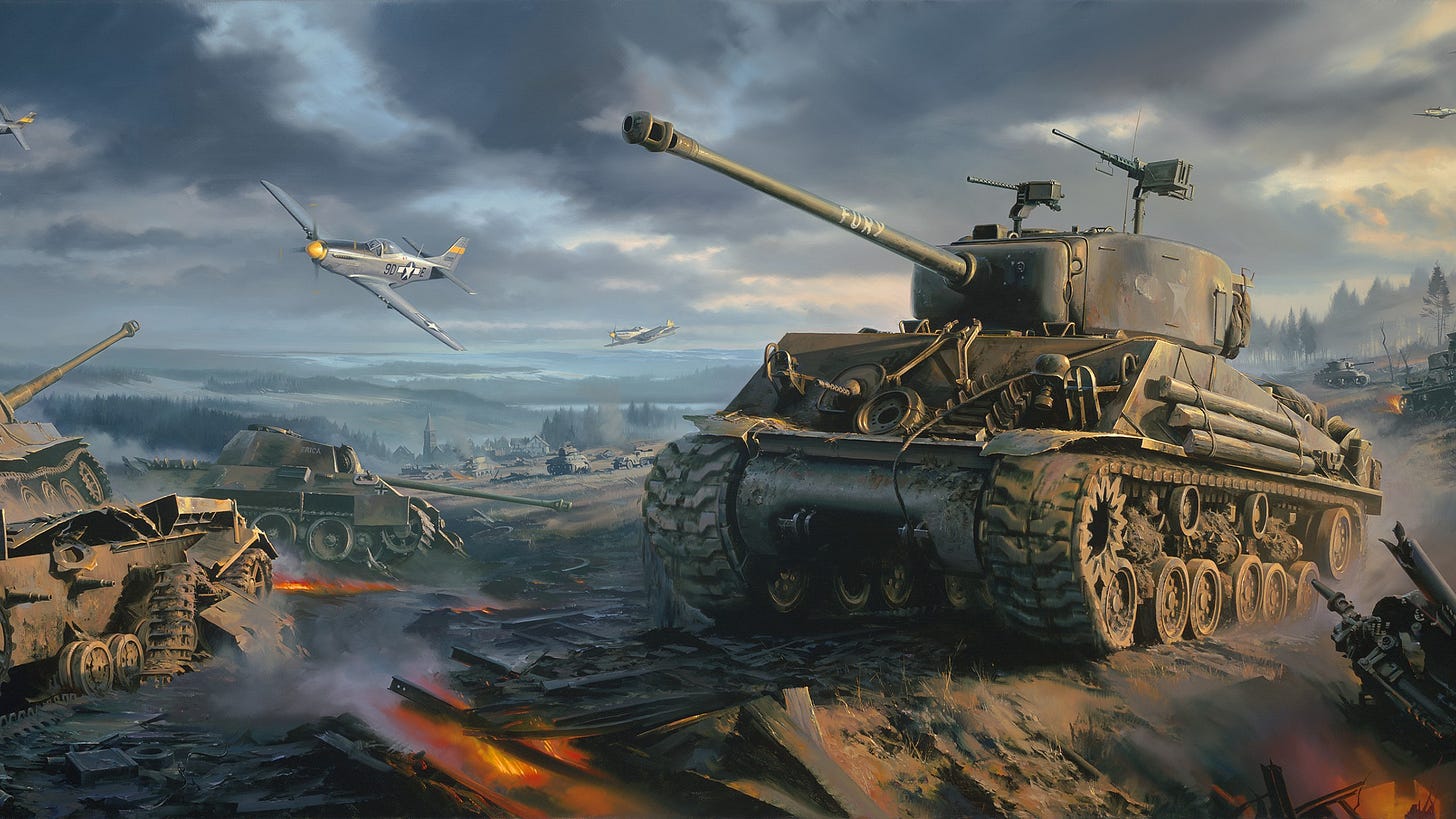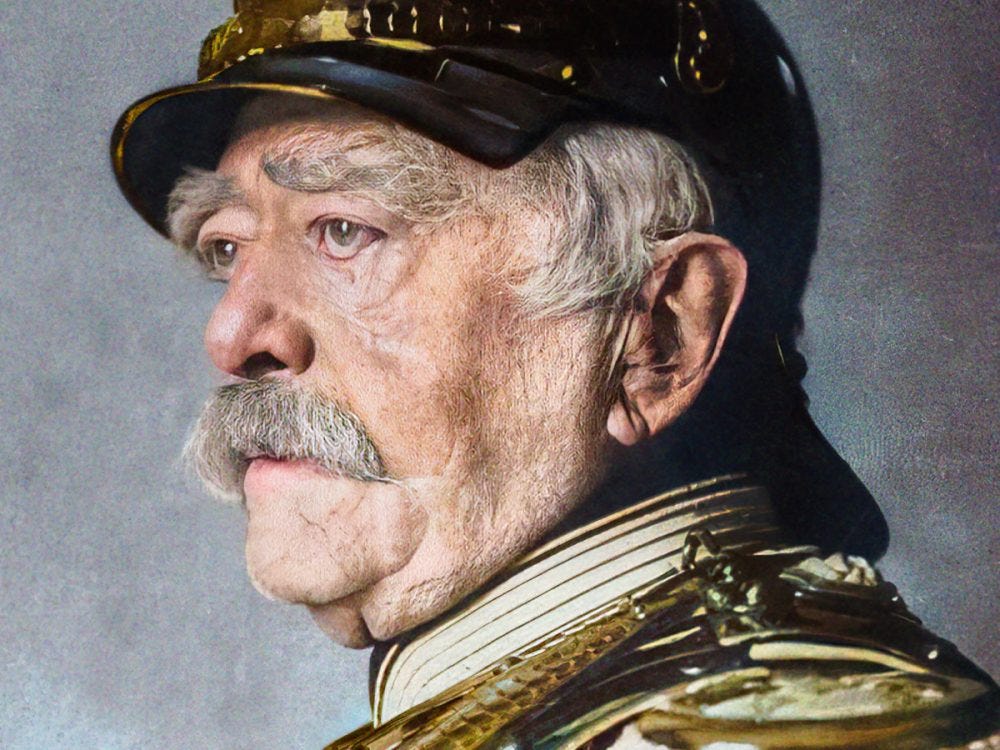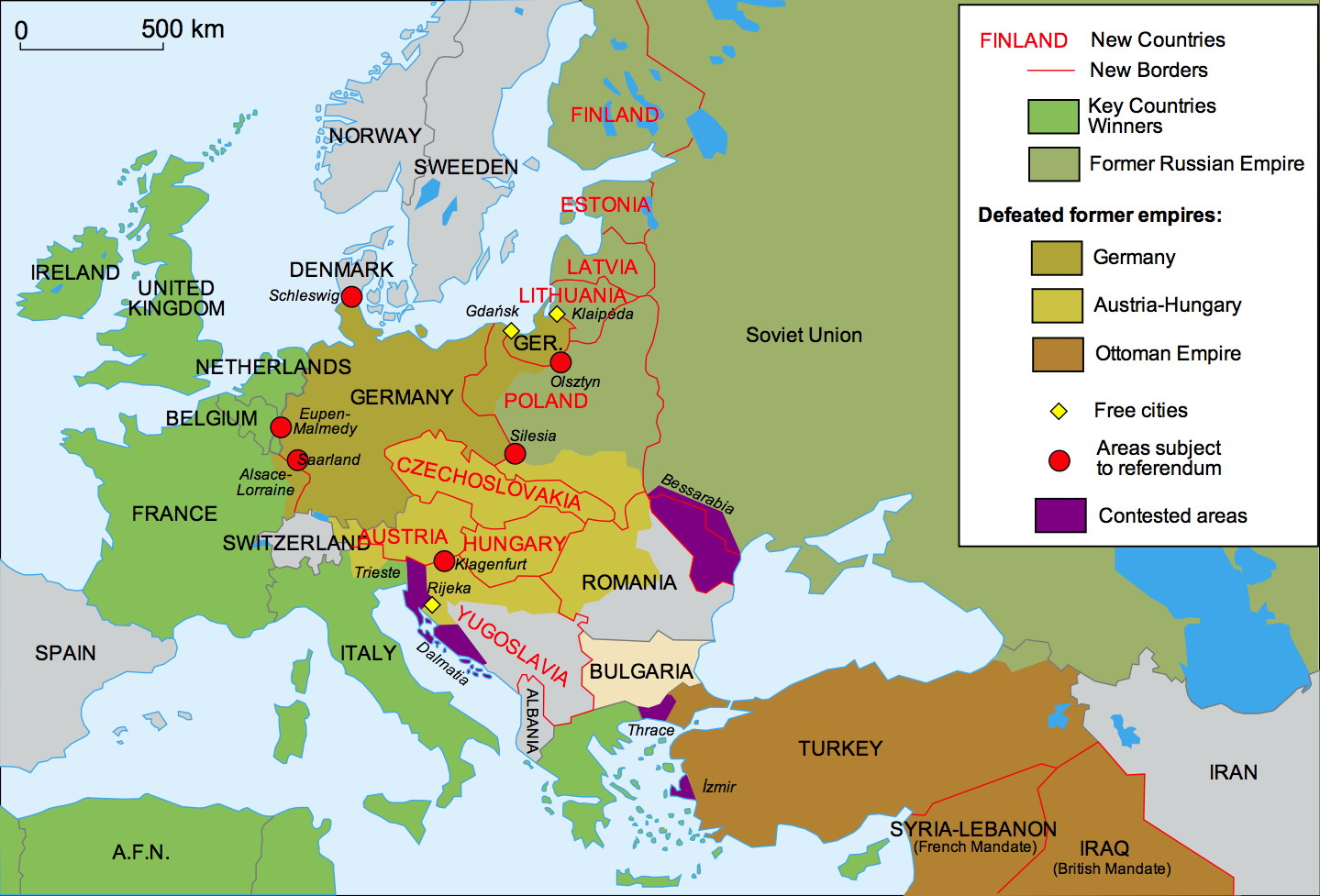How Progress Shaped the Great Power Conflicts of the 20th Century
For the first time Liberal Democratic nations had superior military power to Authoritarian regimes
Progress affects the military balance of power
Most of my book series and this Substack column is about how geography, economics, and technological innovation came together to create human material progress. This created a long-term increase in the material standard of living for the masses.
A society that experiences rapid economic growth, however, does not just transform its citizen’s standard of living. It can also shift the regional or global balance of power. A certain portion of the revenues generated from economic growth can be used to build a powerful military machine.
Particularly if the society experiencing progress has a large population, this potentially upsets the current military balance of power. This in turn potentially changes the winner in future military conflicts. And winners tend to impose their culture, values, and institutions on the loser.
In the 19th Century and early 20th Centuries, we had at least five nations whose industrialization had a major effect on the global military balance:
Britain
Germany
United States
Japan
Russia
These nations were to fight in three separate global conflicts in the 20th Century: World War I, World War II, and the Cold War. In the 21st Century, Communist China went through the same transformation. Hopefully, it will not lead to a fourth global conflict in the future.
The outcome of major military conflicts also has a large impact on the degree to which nations can experience progress in the following generations. The material foundations of progress can be spread by military victories by nations that already have those foundations. Progress can also be crushed if those same nations suffer a military defeat, particularly to an authoritarian regime.
This article is part of my multi-part series on How progress spread across the globe:
How Progress Spread Across the Globe (podcast)
How the Industrial Revolution upset the military balance of power
How Progress shaped the Great Power conflicts of the 20th Century (this article)
The following is an excerpt from my book From Poverty to Progress: Understanding Humanity’s Greatest Achievement. You can purchase discounted copies of my book at my website, or pay full prize at Amazon.
If you are interested in this topic, you should read my “From Poverty to Progress” book series:
Great Power Conflicts of the 20th Century
Another potential turning point in history was the great political and military confrontations of the 20th Century: World War I, World War 2, and the Cold War. The combined military power of the United States and the British Empire was essential for outcomes that did not disrupt the spread of progress.
World progress could probably have survived and continued with a German victory in World War I, but an Axis victory in World War II or a Soviet victory in the Cold War would likely have been catastrophic. While the National Socialists and Communists liked the technologies that free societies produced, their political and ideological model was fundamentally hostile to the decentralization of power (the fourth Key to Progress) and open experimentation. One shudders to think of the consequences of military defeat for the Western Allies in these global struggles.
British and American military power in the 20th Century came directly from the fact that they were previously Commercial societies and early industrializers. The technologies, skills, and social organizations that came from Commercial societies and the Industrial Revolution did not just enhance people’s material standard of living. They also led to a wave of innovations in weapons and armor. Perhaps more importantly, industrial innovations to energy, agriculture, transportation, and communications technology all had important military applications.
One of the key themes of my book series and this Substack column is the importance of food production and distribution. A highly efficient food production and distribution system is one of Five Keys to Progress.
Food is just as important to the military. Soldiers need food before they can fight. That food must be grown, harvested, processed, preserved and distributed so that soldiers can consume it on the battlefield. Indeed, food had always been a critical constraint on military power and strategy. One of Napoleon’s most famous remarks, “An army marches on its stomach” is as true today as it was in his times. Industrial agricultural and transportation technologies made huge industrial armies possible.
Modern tanks, fighters, bombers, battleships, aircraft carriers, and submarines are all weapons platforms derived from industrial transportation technologies. The massive consumption of ammunition and fuel requires vast supply chains that make industrial manufacturing and transportation technologies necessary. The telegraph and radio are all industrial communication technologies that enhance military command and control. All of these technologies require vast consumption of fossil fuels, manufacturing, and industrial materials.
All of this means that the Industrial Revolution radically shifted the global balance of power. This helped to cause the spread of progress to the rest of Europe and Japan.
Agrarian leaders, who could not care less about the material standard of living of the peasants, really did care about the military balance of power. Military power and violent competition were central to their perception of the world.
Agrarian regimes industrialize
What had previously been conservative monarchical regimes concluded that they needed industrial technologies to maintain their relative military power and gain a competitive advantage on late industrializers. They knew that this would inevitably cause great, potentially destabilizing changes, to the very fabric of their societies. They even knew that those changes might threaten their power. In previous eras, they would not have considered “reform from above”, but now they knew that it was essential for the survival of their power.
Three Agrarian powers – Germany, Russia, and Japan – attempted to copy the technologies, skills, and social organizations of Western nations without copying their decentralized and competitive political institutions. They effectively tried to meld together the extractive institutions of Agrarian societies with an Industrial society. In doing so, they turned their nations into industrial and military powers of a very illiberal kind. These nations played a fundamental role in the wars of the 20th Century.
Because many of the rulers of these societies were born before industrialization hit their nations, they preserved the fundamentally zero-sum thinking of their Agrarian heritage. They saw military conquest and expropriation as the means to national progress rather than consensual cooperation and trade.
In doing so, the “reformers from above” sowed the seeds for revolution and radical ideologies. Agrarian regimes in Europe simply could not survive the brutal competition of World War I. Whereas the West, with its long Commercial heritage, was far more urbanized and had far more productive agricultural sectors, the other powers did not have those advantages.
Nations that had never gone through the transition to Commercial Societies had smaller urban populations and less productive agricultural sectors. This limited the number of soldiers because they still needed large numbers of farmers to create the necessary food surplus. It also limited their ability to manufacture weapons and ammunition.
In the long drawn-out confrontation of World War I, the European empires that had dominated the continent for centuries finally cracked. The Russian empire collapsed in 1917, while the German, Austro-Hungarian, and Ottoman empires collapsed in 1918.
Worse, it was not just military defeat. It was a collapse of the entire Agrarian societies. While their leaders believed that they could meld industrial militaries onto Agrarian societies, this was not possible under the pressures of total war.
Most likely, if World War I had never taken place, the European powers would have made a long, slow transition similar to current developing nations. But total war demands rapid change and failure to adapt drives entire regimes into extinction.
The elites of European empires learned a lesson after it was too late. It was not possible to copy Industrial technologies for war without revolutionizing your own society. Trying to find a halfway position between a traditional society and an Industrial society was just not possible, and any leaders who tried risked being annihilated in military defeat or revolution.
With traditional Agrarian regimes in complete collapse, three different revolutionary visions for how to organize an Industrial society stepped forward onto the world stage:
Communism, as represented by the Soviet Union
National Socialism, as represented by Germany
Liberal Democratic Capitalism, as represented by the United States
The outcome of the titanic struggles between these three Super Powers would do much to determine the future of human progress. Ultimately, the nations that were previously Commercial Societies (the UK and the USA) came out on top in each conflict. They were able to do so largely because the UK and the USA:
Had greater economic resources
Could mobilize a higher proportion of those economic resources into military production and logistics
Could mobilize a higher proportion of the labor force for military conscription because relatively few workers were farmers whose food production was essential for the war effort
Had political traditions and institutions that enabled them to count on the full support of their people.
Much of the above is an excerpt from my book From Poverty to Progress: Understanding Humanity’s Greatest Achievement. You can purchase discounted copies of my book at my website, or pay full prize at Amazon.
This article is one article in my multi-part series on How progress spread across the globe:
How Progress Spread Across the Globe (podcast)
How the Industrial Revolution upset the military balance of power
How Progress shaped the Great Power conflicts of the 20th Century (this article)
If you are interested in this topic, you should read my “From Poverty to Progress” book series:













You implied that developing countries aren't reforming their institutions because they aren't subject to military competition in the same way Germany, Japan and Russia was. I half agree with your statement. Developing countries are actually growing faster than ever before. Global inequality has been falling since the 90s and we currently at pre WW1 levels of inequality. Much of it has to do with the death of feudalism in Asia from the 50s to 80s which, I'd argue, was more motivated by nationalism.
You could argue the lack of development in Africa is a product of lack of military competition. I can also argue it is the result a weaker sense of national identity.